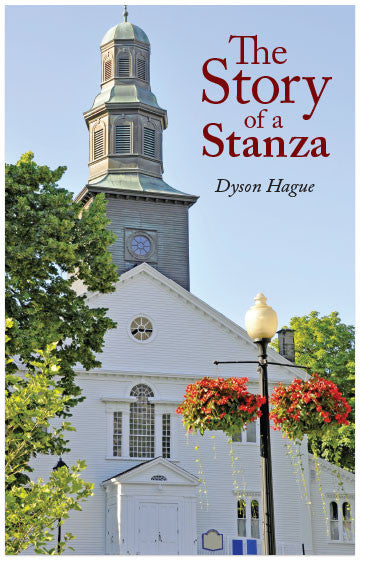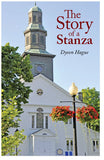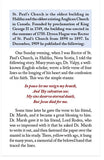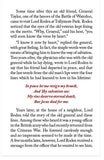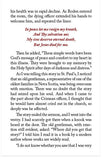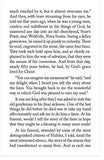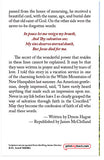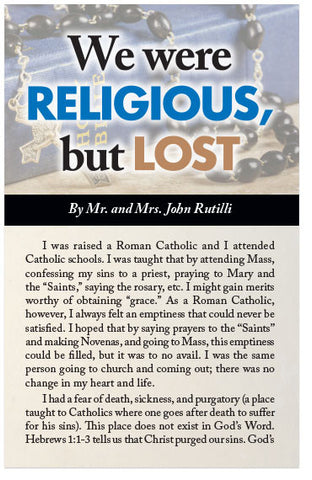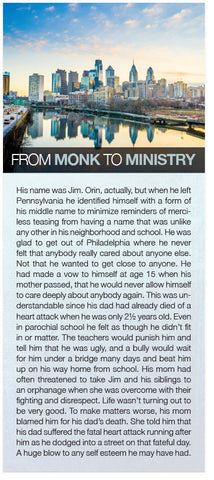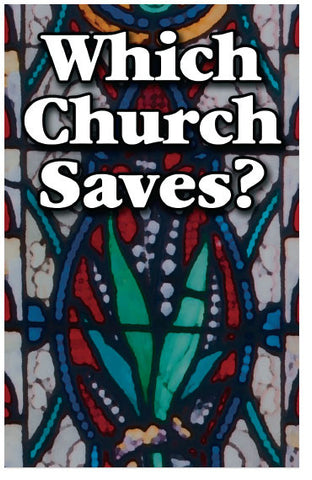The Story of a Stanza
Special-Order Folded Tract
 NOTE: This item is custom-printed to order (click for more details).
NOTE: This item is custom-printed to order (click for more details).
This tract is from our print-on-demand library, and is not kept in stock. Select the options below, and we will custom-print a batch just for you. Because this item is custom-printed, you can add your custom imprint to the back page at no extra cost.
- Estimated shipping date: Tuesday, November 18 (Click for more details)
- SKU:
- Discounts: Discount coupons do not apply to this item
- Format: Folded Tract
- Size: 3.5 inches x 5.5 inches
- Pages: 6
- Imprinting: Available with 3 lines of custom text
- Version: KJV
- Returns: Because this item is custom-printed to order, it cannot be returned.
Show all item details
The full text of this tract is shown below in the KJV version. (Do you want to print this tract in a different version than the one listed? Contact us and let us know what you're looking for—we may be able to create the alternate version for you at no charge.)
St. Paul’s Church is the oldest building in Halifax and the oldest existing Anglican Church in Canada. Founded by proclamation of King George II in 1749, the building was erected in the summer of 1750. Dyson Hague was Rector of St. Paul’s Church from 1890 to 1897. In December, 1909 he published the following:
One Sunday evening, when I was Rector of St. Paul’s Church, in Halifax, Nova Scotia, I told the following story. Many years ago, Dr. Valpy, a well-known English scholar, wrote a little verse of four lines as the longing of his heart and the confession of his faith. This was the simple stanza:
In peace let me resign my breath,
And Thy salvation see;
My sins deserve eternal death,
But Jesus died for me.
Some time later he gave the verse to his friend, Dr. Marsh, and it became a great blessing to him. Dr. Marsh gave it to his friend, Lord Roden, who was so impressed with it that he asked Dr. Marsh to write it out, and then fastened the paper over the mantel in his study. There, yellow with age, it hung for many years, a memorial of the beloved hand that traced the lines.
Some time after this an old friend, General Taylor, one of the heroes of the Battle of Waterloo, came to visit Lord Roden at Tollymore Park. Roden noticed that the eyes of the old veteran kept fixing on the motto. “Why, General,” said his host, “you will soon know the verse by heart.”
“I know it now by heart,” replied the general, with great feeling. In fact, the simple words were the means of bringing him to know the way of salvation. Two years after, the physician who was with the old general while he lay dying, wrote to Lord Roden to say that his friend had departed in peace, and that the last words from the old man’s lips were the four lines which he had learned to love in his lifetime:
In peace let me resign my breath,
And Thy salvation see;
My sins deserve eternal death,
But Jesus died for me.
Years later, at the home of a neighbor, Lord Roden told the story of the old general and these lines. Among those who heard it was a young officer in the British army who had recently returned from the Crimean War. He listened carelessly enough and no impression seemed to be made at the time. A few months later, however, Lord Roden received a message from the officer that he wanted to see him; his health was in rapid decline. As Roden entered the room, the dying officer extended his hands to welcome him, and repeated the lines:
In peace let me resign my breath,
And Thy salvation see;
My sins deserve eternal death,
But Jesus died for me.
Then he added, “These simple words have been God’s message of peace and comfort to my heart in this illness. They were brought to my memory by the Holy Spirit after days of darkness and distress.”
As I was telling this story in St. Paul’s, I noticed that an old gentleman, a representative of one of the oldest families in Nova Scotia, was being overcome with emotion. There was no doubt that the story had seized upon his soul. And when I came to the part about the Crimean officer, I thought that he would have almost cried out in the church, so deeply was he affected.
The story ended the sermon, and I went into the vestry. I had scarcely got there when a knock was heard at the door. The old gentleman, with emotion still evident, asked: “Where did you get that story?” I told him I read it in a book by a modern author whose works are widely read.
“I do not know whether you saw that I was very much touched by it, but it almost overcame me.” And then, with tears streaming from his eyes, he told me that years ago, when he was a young man, careless and indifferent in the things of God, he sauntered one day into an old churchyard, Starr’s Point, near Wolfville, Nova Scotia. Seeing a fallen gravestone, he raised it up purely in curiosity. There he read, engraved in the stone, the same four lines. They took such hold upon him, and so clearly explained to him the way of salvation, that they were the means of his conversion. And from that day, nearly fifty years before, he had, by God’s grace lived for Christ.
“You can imagine my amazement” he said, “and my delight when I heard you tell the story about the lines. You brought back to me the wonderful way in which God was pleased to save my soul.”
It was not long after that I was asked to visit this old gentleman in his final sickness. One of the last things he did before he died was to take my hand affectionately and ask me to do him a favor. At his funeral, would I tell the story of the lines in hope that they might be a blessing to many more souls?
At his funeral, attended by some of the most distinguished citizens of Halifax, I told, amid the most interested silence, the story of the stanza that had transformed so many lives. And as each one passed from the house of mourning, he received a beautiful card, with the name, age, and burial date of that old saint of God. On the other side were the never-to-be-forgotten words:
In peace let me resign my breath,
And Thy salvation see;
My sins deserve eternal death,
But Jesus died for me.
The secret of the wonderful power that resides in these lines cannot be explained. It may be that they were written in prayer and watered by tears of love. I told this story in a vacation service in one of the charming hotels in the White Mountains of New Hampshire last summer. An American gentleman, deeply impressed, said, “I have rarely heard anything that made such an impression upon me. Never in my life before have I so clearly grasped the way of salvation through faith in the Crucified.” May they become the confession of faith of all who read these words.
— Written by Dyson Hague
— Republished by James McClelland

